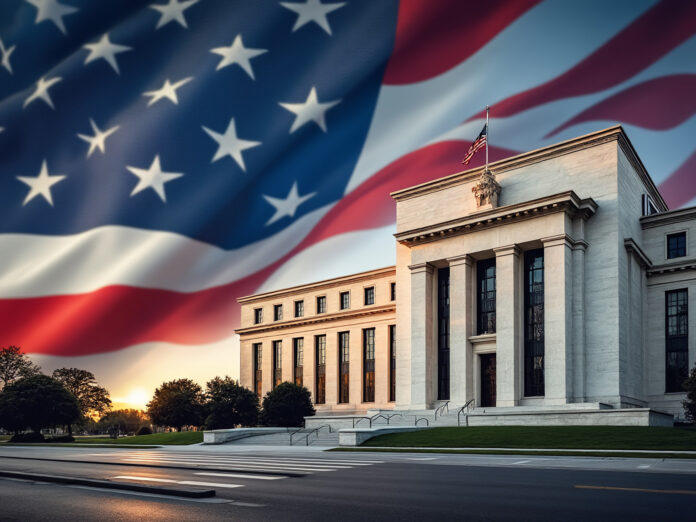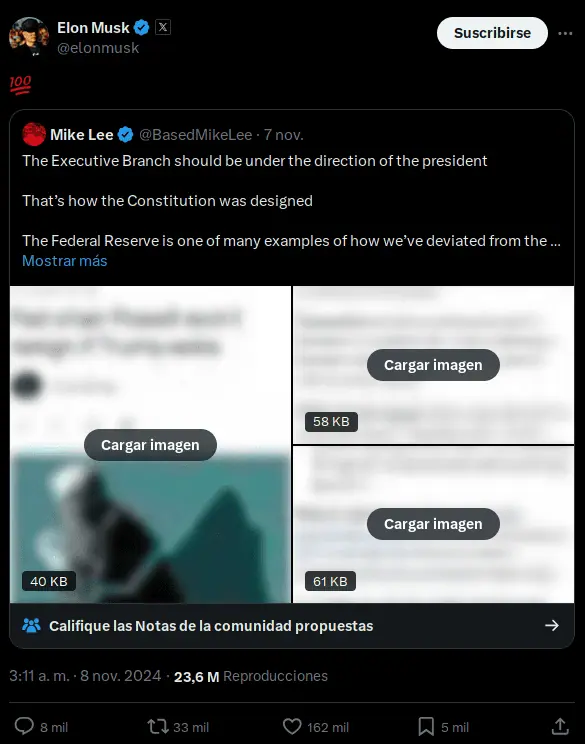
Elon Musk is one of the leading figures who supports the idea of permanently closing the United States Federal Reserve and creating a more open and decentralized financial system.
Elon Musk, known for owning X, Tesla and SpaceX, has shown his support for a proposal to abolish the US Federal Reserve (FED). Through his X account, Musk shared a post Utah Senator Mike Lee commented on the move with a “100” emoji, indicating his agreement. This gesture is not just symbolic support, but is in line with his critical view towards the traditional and centralized financial system.
Senator Mike Lee argued that Federal Reserve Chairman Jerome Powell's refusal to step down despite a possible request from President-elect Donald Trump represents an excess of authority. According to Lee, “The Federal Reserve is one of many examples of how we have strayed from the Constitution.” Powell's position of not leaving the Fed is seen by Lee as “another reason why we should put an end to it” to this entity.

Political and economic context
Discontent with centralized banking has been on the rise, especially as the US national debt surpasses $35 trillion. Rising concerns about inflation have led to Bitcoin (BTC) gaining ground as a safe haven against the eroding purchasing power of the dollar. This trend is not new; political figures and officials have begun to consider BTC as a safe haven asset.
A recent example is Jimmy Patronis, the Florida governor's chief financial officer, who proposed including Bitcoin in the state's strategic reserve. In this political and economic context, a bill was introduced to the United States Congress in May of this year. “End the FED”, introduced by Congressman Thomas Massie. This bill, driven by the inflation that has affected Americans since the massive printing of dollars during the COVID-19 pandemic, seeks to end the Federal Reserve.
The role of the Federal Reserve
Although the US Federal Reserve is an institution independent of the federal government, including the president, this independence is crucial to ensure that monetary policies are implemented based on economic considerations and not temporary political pressures. At most, the president of the country can nominate the new head of the FED. But his power is limited to that nomination. He cannot remove the FED chairman at will, nor directly influence the institution's monetary policy decisions.
However, the current debate over the abolition of the Federal Reserve not only reflects a critique of the current financial system, but also a deeper concern about economic governance and monetary sovereignty in the United States. With figures such as Elon Musk entering the conversation, this topic takes on significant resonance in public discourse, opening the door to discussions about radical financial reforms in one of the most influential countries in the world.
A distorted entity
However, the Fed's initial role of creation, that of serving as the central bank for the United States, has been distorted. Remember that the Fed has the power to print money, which can lead to inflation if done in excess. A situation that the Fed has thus far exacerbated. With a debt of 35 trillion dollars, the United States has a debt (adding domestic and foreign debt) greater than its GDP, a huge economic imbalance that the Fed has increased over time.
As a result, the FED has caused the dollar to depreciate by more than -1913% since its birth in 97, with $1 (in 1913) currently worth $0,03, despite the fact that the economy has grown and strengthened. And the main reason for this is the money printing carried out by the FED, something that became very clear with the current inflation crisis in the country as a result of the economic aid printing measures given during the COVID-19 pandemic.
But in addition to all this, the elimination of the FED could pave the way for a more decentralized financial system, where monetary decisions are not concentrated in the hands of a few. A space where technologies such as blockchain allow greater transparency and control by citizens. This could also accelerate the adoption of cryptocurrencies and other innovative financial technologies, offering greater efficiency, security and accessibility in financial transactions.
Finally, eliminating the Fed could force the government to be more responsible in its spending and reduce the national debt. A less indebted government could lead to a more stable and resilient economy in the face of financial crises.
Musk's criticism of the financial system
Musk’s support for the proposal to abolish the FED is not surprising, given his history of criticizing the traditional financial system. Musk has been a vocal proponent of cryptocurrencies, especially Bitcoin, arguing that centrally controlled fiat currencies are susceptible to inflation and depreciation in value. This stance is reflected in the policies of his companies, such as Tesla, which has accepted Bitcoin as a form of payment and invested in the cryptocurrency.
The proposal to abolish the Federal Reserve thus has significant implications for the global economy. If implemented, it could drastically change the way monetary policy is conducted in the United States and, by extension, the world. Proponents of the proposal argue that a decentralized financial system, based on cryptocurrencies and blockchain technologies, could offer greater transparency and control to citizens.



